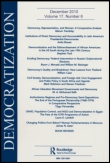 Authoritarian governments have reacted to the prospect of color revolutions by adopting a range of actions and policies described by the late Belarusan political scientist and former NED Reagan-Fascell fellow Vitali Silitsky (right) as ‘pre-emptive authoritarianism’, Evgeny Finkel and Yitzhak M. Brudny write for Democratization, namely:
Authoritarian governments have reacted to the prospect of color revolutions by adopting a range of actions and policies described by the late Belarusan political scientist and former NED Reagan-Fascell fellow Vitali Silitsky (right) as ‘pre-emptive authoritarianism’, Evgeny Finkel and Yitzhak M. Brudny write for Democratization, namely:
(1) tactical pre-emption, that is, attacks on the opposition, the civil society, and their infrastructures;
(2) institutional pre-emption, which focuses on changing the fundamental rules of the political game to the incumbents’ advantage; and
(3) cultural pre-emption – the manipulation of public consciousness and collective memory to spread stereotypes and myths about the opposition, the West, and democracy in general.
 Faced with the threat of regime change, authoritarian incumbents can and do rely on at least one of five major strategies. they add:
Faced with the threat of regime change, authoritarian incumbents can and do rely on at least one of five major strategies. they add:
- Isolation: The authoritarian government can attempt to isolate itself from unwanted external influences by refusing to register foreign non-governmental organizations (NGOs), by withholding visas from election observers, or by shutting down and censoring media outlets.
- Marginalization: It can marginalize or almost completely eliminate the opposition by tinkering with electoral legislation, limiting opposition leaders’ access to mass media, and by presenting the opposition in a highly negative light, such as being greedy, corrupt and unpatriotic pawns of foreign powers.
- Distribution: It can reward loyalists or buy off important or potentially threatening groups.
- Repression: It can also punish by withholding benefits, rents or income from subversive elites and businesspeople, force challengers into exile, or have them imprisoned or disappear.
- Persuasion: The government can try to convince the population that the opposition’s democratic ideals are alien to the country’s history, tradition and identity, funded by foreign security services, or driven by US and Western geopolitical and economic interests.







